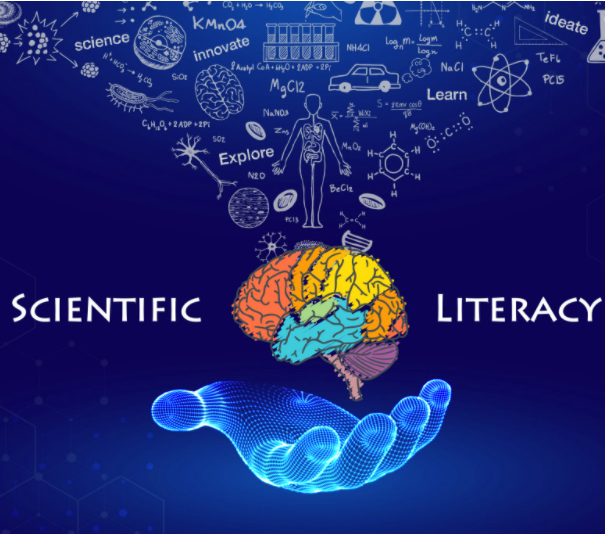Bèta Burgerschap

|
Bèta Burgerschap: leerlingen/volwassenen die (kunnen) nadenken over maatschappelijk-technologische vragen. |
Samenvatting
Scientific literacy or science literacy encompasses written, numerical, and digital literacy as they pertain to understanding science, its methodology, observations, and theories.
Verwijzingen
- Cosmos EU-project (2021-2025)
- Samen werken aan Bèta Burgerschap (TechYourFuture)
- (2017). Weten is nog geen doen. Een realistisch perspectief op redzaamheid (PDF) (pp. 186). Den Haag: Wetenschappelijke Raad voor het Regeringsbeleid.
- Amos, R., Knippels, M.-C. and Levinson, R. (2020). Socio-Scientific Inquiry-Based Learning: Possibilities and Challenges for Teacher Education Contemporary Trends and Issues in Science Education, 41–61. doi:10.1007/978-3-030-40229-7_4 .
- Balundė, A., Pokus, M. S., Jovarauskaitė, L., Sarid, A., Farangitakis, G., Knippels, M.-C., Hadjichambis, A. C. and Paraskeva-Hadjichambi, D. (2020). Values, Beliefs and Environmental Citizenship Environmental Discourses in Science Education, 83–96. doi:10.1007/978-3-030-20249-1_6 .
- Canjels, J. and Jonker, V. (2022). Kritisch burgerschap en de Grote Rekendag (PDF) Volgens Bartjens, 41(5). .
- Gericke, N., Huang, L., Knippels, M.-C. and Christodoulou, A. a. (2020). Environmental Citizenship in Secondary Formal Education: The Importance of Curriculum and Subject Teachers Environmental Discourses in Science Education, 193–212. doi:10.1007/978-3-030-20249-1_13 .
- Gifford, C., Gocsal, A., Rado, B., Gonçalves, S. and Wolodzko, E. (2007). Intercultural learning for European citizenship: How every higher education course can develop competences to appreciate diversity and multiculturality, work in international contexts, and understand other cultures and customs. London: London Metropolitan University.
- Guérin, L., Klaver, L., Walma van der Molen, J. and Sins, P. (2021). Onderzoeksrapport Samen werken aan Bèta Burgerschap (PDF) (pp. 60). Deventer: TechYourFuture.
- Hadjichambis, A. C., Reis, P., Paraskeva-Hadjichambis, D., Cincera, J., Boeve-de Pauw, J., Gericke, N. and Knippels, M. C. (Eds.). (2019). Conceptualizing environmental citizenship for 21st century education. Amsterdam: Springer.
- Hazelkorn, E. (2015). Science education for Responsible Citizenship (PDF) (pp. 88). Brussels: European Commission.
- Klaver, L. T., Sins, P. H. M., Walma van der Molen, J. H. and Guérin, L. J. F. (2022). Strengthening science education through attention to student resources: A conceptualization of socioscientific capital (PDF) Journal of Research in Science Teaching. doi:10.1002/tea.21827 .
- Klute, E. Intercultural digital citizenship in the community, toolkit on media and digital literacy skills for migrant and socially marginalized families (PDF). Utrecht: Mira Media.
- Knippels, M. C. P. J. and Van Dam, F. W. (2017). PARRISE, Promoting Attainment of Responsible Research and Innovation in Science Education, FP7 : Rethinking science, rethinking education (PDF) Impact, 2017(5), 52 – 54. .
- Knippels, M. C. P. J. and van Harskamp, M. (2018). An educational sequence for implementing socio-scientific inquiry-based learning (SSIBL) (PDF) School Science Review, 100(371), 46-52. .
- Kolstø, S. D. (2008). Science education for democratic citizenship through the use of history of science Science & Education, 17(8), 977-997. doi:10.1007/s11191-007-9084-8 .
- Maass, K., Doorman, L. M., Jonker, V. and Wijers, M. (2019). Promoting active citizenship in mathematics teaching (PDF) ZDM, 51(6), 1-13. doi:10.1007/s11858-019-01048-6 .
- Maass, K., Doorman, L. M., Jonker, V. H. and Wijers, M. M. (2019). Promoting active citizenship in mathematics teaching ZDM – International Journal on Mathematics Education, 51(6), 991–1003. doi:10.1007/s11858-019-01048-6 .
- Navracsics, T. (2018). Key competences for lifelong learning (PDF). Brussel: European Union.
- Paraskeva-Hadjichambi, D., Goldman, D., Hadjichambis, A. C., Parra, G., Lapin, K. and Knippels, M.-C. a. (2020). Educating for Environmental Citizenship in Non-formal Frameworks for Secondary Level Youth Environmental Discourses in Science Education, 213–235. doi:10.1007/978-3-030-20249-1_14 .
- Paul, R. W. and Binker, A. J. A. (1990). Critical thinking: What every person needs to survive in a rapidly changing world. Center for Critical Thinking and Moral Critique (PDF): Sonoma State University; Center for Critical Thinking and Moral Critique.
- Pedersen, A. Y., Nrgrd, R. T. and Kppe, C. (2018). Patterns of Inclusion: Fostering Digital Citizenship through Hybrid Education Journal of Educational Technology Society, 21(1), 225–236. .
- Raveendran, A. and Bazzul, J. (2021). Socialized medicine has always been political: COVID‑19, science and biopower in India Cultural Studies of Science Education, 16, 995–1013. doi:10.1007/s11422-021-10093-1 .
- Sinnige, A. and Spoelstra, T. (2022). Burgerschap in de klas. Assen: Van Gorcum.
- Skovsmose, O. (1985). Mathematics education vs critical education (PDF) Educational Studies in Mathematics, 16(4), 337-354. .


